Updated 8:17 p.m. — The de Blasio administration will offer public school space to four charter schools, officials announced Wednesday, signaling an end to a space-sharing moratorium in place since de Blasio took office in January.
The schools include two Success Academy charter schools run by former City Council Member Eva Moskowitz, a political rival of de Blasio who has fought him over his space-sharing policies for months. The announcement is the first sign of how his administration will handle the state’s new charter-school law, which requires the city to provide new and growing charter schools with space in city-owned buildings or with rent money to operate in private space.
Establishing a “moratorium” on school co-locations has always been more of a campaign pledge for de Blasio than a concrete policy. In just his second month in office, de Blasio announced eight new space-sharing plans along with the framework of a process for gaining public feedback about the proposals. But the plans weren’t controversial and city officials said they would continue to hold off on more disruptive proposals.
Today’s announcement did not include details about where the schools would actually be located, or any details about the new co-location process that de Blasio has promised. And city officials said their timing was mostly motivated by a Thursday deadline to respond to requests for public space from the first two schools, Bronx Success Academy III and Bed-Stuy Success Academy I. Both elementary schools’ space-sharing plans, first approved by the Bloomberg administration, will expire at the end of the year.
“We’re encouraged that the administration wants to work with public charter schools and make sure parents have great options for their children, regardless of zip code,” Moskowitz said in a statement. “We look forward to getting more details.”
De Blasio has been outspoken about his objection to former Mayor Michael Bloomberg’s approach to siting charter schools in city-owned buildings, which critics said ignored feedback from parents and teachers at the affected schools. He also said he thought charter schools in public space should pay rent, and vowed that no new plans would be proposed until the city improved the process.
The passage of the new law, led by Gov. Andrew Cuomo, was in part a rebuke of the mayor’s agenda, which some saw more as an effort to curtail the growth of charter schools. It also created a new dilemma for de Blasio, whose administration is now required to provide space or funding for it.
After legislation was enacted in April, charter schools began sending letters to the Department of Education requesting space in public schools. De Blasio could have ignored the requests, opting instead to pay for the schools to operate in private facilities. By telling charter schools that they’ll get access to city-owned buildings next year, de Blasio signaled that he’s willing to include them in his space-sharing vision for city’s 1,100-building school system.
In addition to the Success schools, the city said it would work to provide public space for two other schools that submitted requests in April: Bronx Charter School for Better Learning II, one of at least six approved to open next year, and Launch Expeditionary Learning Charter School in Brooklyn, which opened in 2012 but has run out of space in its current building. Both are members of the Coalition of Community Charter Schools, a group with much closer ties to de Blasio.
“This is another really good step forward and we’re very happy for the students these schools serve,” said New York City Charter School Center CEO James Merriman, whose organization has published guidance to help schools interpret the new legislation. “We’re confident we can make this law work for everyone.”
The city did tell one school that public space was not a possibility. Global Community Charter School, a school operating in private space in Harlem, was denied space because there was not enough room in city-owned buildings in the district, officials said.
Department officials have said that as many as two dozen charter schools had requested co-locations by July, including some schools in private space that are still adding grades. De Blasio will soon have to respond to space requests from those schools, as well as requests from at least 16 schools planning to open in 2015.


